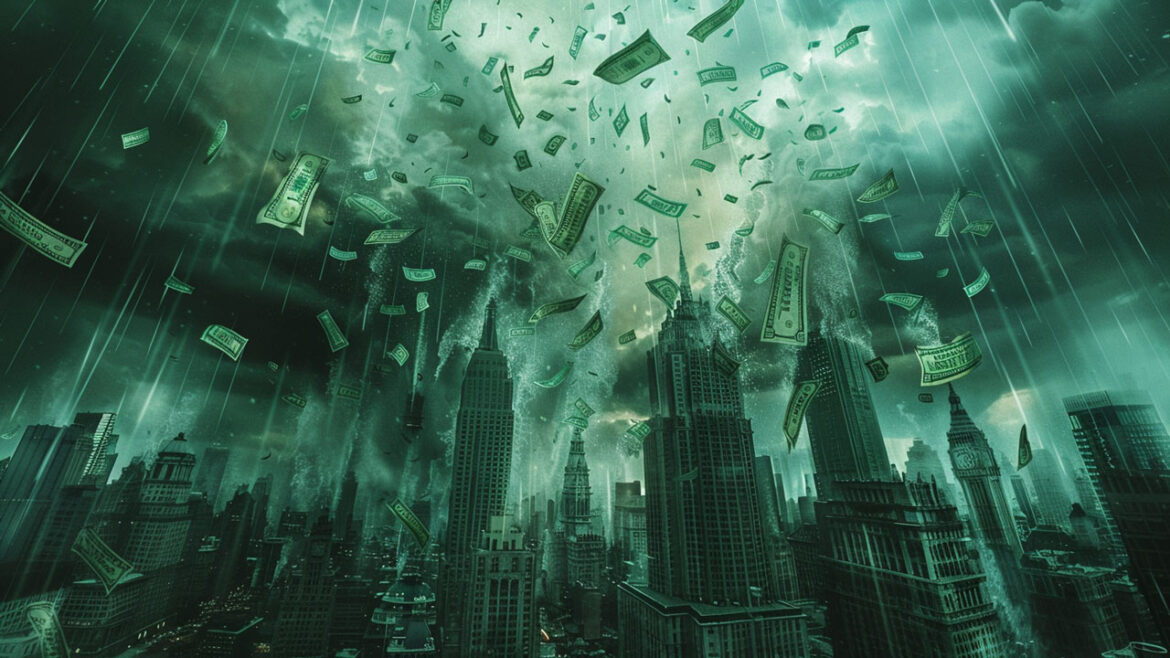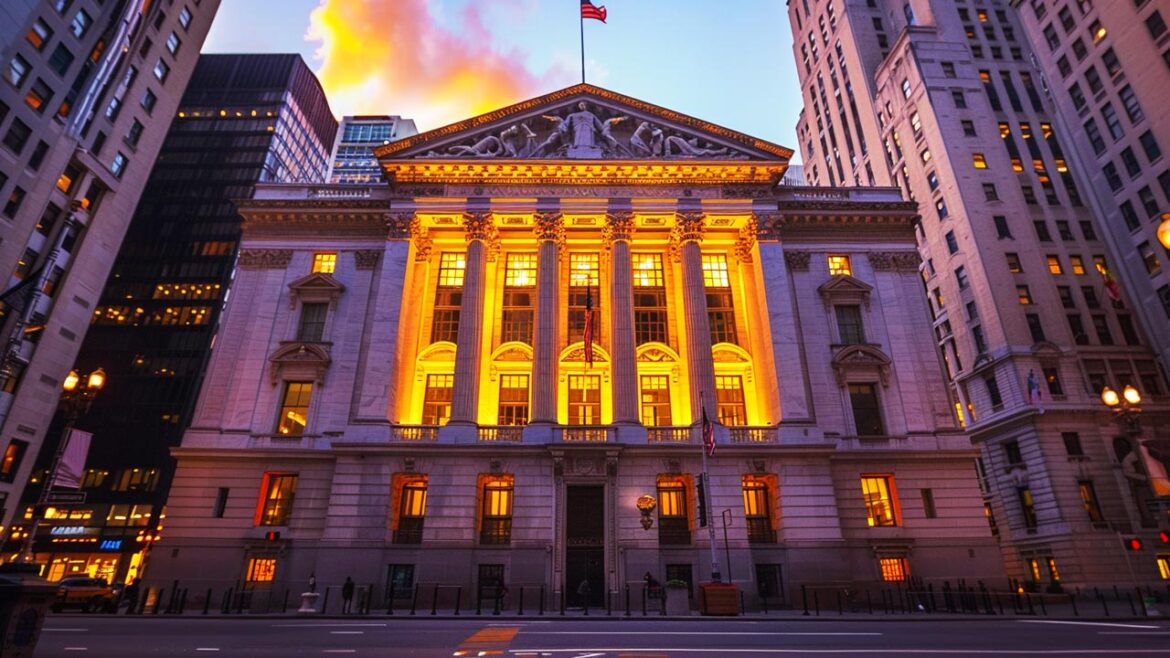Precious metals are apparently waking up. And here is where you can find the best deals.
Site:
Precious metals news
Due to the strong U.S. dollar, exacerbated by the Federal Reserve's interest rate hikes since March 2022, China's central bank, among others, is increasingly investing in gold as a hedge against economic uncertainty. With the Dollar Index up 10% since early 2022, the cost of imports for emerging nations like China has surged, further driving their shift towards gold. This trend has led to a record spike in gold prices, as evidenced by China's central bank adding 60,000 troy ounces to its reserves in April alone, marking the 18th consecutive month of significant gold acquisitions.
In 2009, 140 banks failed, and a recent report from financial consulting firm Klaros Group says that hundreds of banks are at risk of going under this year. It’s being billed mostly as a danger for individuals and communities than for the broader economy, but for stressed lenders across America, a string of small bank failures could quite quickly spread into a larger bloodbath — especially in an economy with hot inflation and a feverish addiction to ultra-low interest rates.
The notion that huge Chinese gold demand is driving the price may have some merit after all. According to GoldChartsRus.com, there was a massive $1 billion worth of gold moved into one of the Chinese Gold ETFs just yesterday. Here is the most recent Gold Depositories update as of May...
China's central bank added to its gold reserves for the 18th consecutive month in April, though the rate of acquisition has slowed due to soaring gold prices. The People’s Bank of China, a major player in the bullion market, purchased 60,000 troy ounces in April, a significant decrease from the 160,000 ounces bought in March and 390,000 in February. This slowdown occurs as gold prices hit record highs, impacting demand even as first-quarter purchases by central banks globally were the strongest on record, driven in part by these institutions, as noted by the World Gold Council and supported by insights from Goldman Sachs on continued potential in emerging markets.
On Tuesday, the U.S. dollar saw a slight decline overall but gained strength against the Japanese yen amidst ongoing expectations of significant interest rate differentials. Despite recent warnings from Japanese officials about potential interventions to support the yen, the U.S. dollar's resilience highlights the anticipation of continued disparity in monetary policies. Japan's top currency diplomat, Masato Kanda, indicated the possibility of taking action against disorderly, speculative foreign exchange movements, following two suspected interventions last week that totaled nearly $60 billion.
Crude oil futures climbed on Tuesday after Israeli Prime Minister Benjamin Netanyahu dismissed a Hamas-approved cease-fire proposal as "sabotage," committing instead to continue military operations in Rafah, Gaza. Netanyahu critiqued the proposal for falling short of Israel's essential demands. This rejection comes amid ongoing conflict, with Israeli forces taking control of the Rafah border crossing, an action that drew criticism from Egypt, which has been mediating the cease-fire talks. Defense Minister Yoav Gallant asserted that operations in Rafah would persist until their objectives regarding Hamas are met.
Copper prices briefly soared above $10,000 a ton amid investor optimism about potential Federal Reserve rate cuts and a warning from Goldman Sachs about escalating supply shortages. The surge was part of a broader rally in risk assets, sparked by weaker-than-expected U.S. job figures, which fueled speculation of imminent Fed rate reductions. Despite a slight retreat in European trading, the outlook for copper remains bullish, driven by persistent supply-demand imbalances. Goldman Sachs has responded by lifting its year-end copper price forecast from $10,000 to $12,000 a ton.
In this deep dive, Mike Maloney unpacks the complexities of our current economic landscape with sharp precision.
 US Treasuries Boom: Paying Out $2 Million Per Minute Amidst Rising Yields
US Treasuries Boom: Paying Out $2 Million Per Minute Amidst Rising YieldsMay 7, 2024 - 08:59:00 EDT
US Treasuries are generating unprecedented returns, paying out about $2 million per minute in interest, as yields have surged to over 4% from virtually zero just two years ago. This dramatic shift, spurred by rate hikes from the Federal Reserve, has revitalized Treasuries as a stable source of income, reflecting their traditional economic role. Last year alone, interest payments on US government debt nearly doubled the decade's average to $900 billion, with projections from the Congressional Budget Office expecting this figure to continue rising annually.
Gold's price rebound has stalled this week, remaining capped below $2330 as it shows little response to US bond yields, the US dollar, or recent geopolitical developments. The market has entered a phase of consolidation, maintaining a narrow trading range with support near $2286 and resistance at $2330. Despite the general upward momentum, gold has struggled to break above the $2330 mark, largely unaffected by stable US bond yields and the dollar, as well as ongoing geopolitical tensions. For now, traders are favoring a range-bound strategy until a clear directional signal emerges.
China's "silver economy," driven by the middle-aged and elderly populations, is sparking a new gold rush. In 2023, retail sales from large-scale jewelry enterprises soared to 331 billion RMB ($45.7 billion), marking a 13.3% year-over-year increase, one of the highest growth rates across consumer goods. This surge in demand, both for personal adornment and investment, has prompted a significant uptick in new business registrations in the jewelry sector. Over 2.6 million new companies were registered from January to October 2023 alone, demonstrating an 89.9% increase from the previous year.
The upcoming 2024 U.S. presidential election is poised to significantly influence the markets for gold, silver, Platinum Group Metals (PGMs), copper, and crude oil. Regardless of whether the current political balance of power remains or shifts, the anticipated policy debates and adjustments in response to public opinion are expected to shape market dynamics. Notably, a potential change in administration could lead to reduced environmental spending impacting copper and silver negatively, while possibly benefiting PGMs and fossil fuels. The election's outcome will also affect America's foreign policy stance, particularly towards China and Iran, further influencing gold and oil prices.
In the midst of escalating geopolitical tensions, gold and copper have become key commodities, not just weathering market volatility but flourishing. Gold, a long-established safe-haven asset, has seen prices soar to near record highs due to its appeal in uncertain times, with central banks, especially in emerging markets, significantly boosting their reserves—290 tons in the first quarter of 2024 alone, a record according to the World Gold Council. This trend underscores a strategic pivot towards gold as a reserve currency, moving away from the U.S. dollar, and suggests that both gold and copper may be at the start of a prolonged bull market that investors should closely watch.
On Friday, Peter participated in an exhilarating debate over the merits of gold and Bitcoin. Professor of economics Nouriel Rabini joined Peter to debate Erik Voorhees and Anthony Scaramucci, two proponents of Bitcoin. They cover a lot of ground in their 2+ hour debate, so be sure to watch the full video on Peter’s youtube channel.
With the eventual introduction of central bank digital currency (CBDCs) now seemingly inevitable, there are a lot of directions central banks could take with their digital currency projects that would have dramatic implications for the price of gold.
Inflation is reshaping the American middle-class dream. Once believing that a six-figure income would ensure a comfortable lifestyle with regular vacations and the ability to buy a home, many people today with "good jobs" find achieving these goals is nearly impossible. The reality of saving for a house or planning for future financial security feels out of reach for many, reflecting a broader trend where many in the middle class feel financially strained despite growing earnings and stable employment.
May 6, 2024 - 12:28:39 EDT
China's aggressive gold purchasing has significantly influenced the market, driving prices to over $2,400 per ounce amid global instability from conflicts like Ukraine's invasion and the Gaza war. This trend persists due to diminished confidence in traditional Chinese investments such as real estate and stocks, combined with the nation's central bank increasing its gold reserves and reducing U.S. debt holdings. Additionally, Chinese speculators anticipate further price gains, enhancing China's already substantial impact on the global gold market. This surge continues despite typical deterrents like rising interest rates and a strong U.S. dollar, marking a nearly 50% price increase since late 2022.
May 6, 2024 - 12:24:05 EDT
The U.S. debt is escalating to unprecedented levels, and according to a former White House economist, Generation Z will bear the financial brunt of this burden, which has been exacerbated by previous generations and worsened by the Treasury Department's missed opportunities to mitigate the impact.
Crude oil's geopolitical risk premium, a surge in price due to fears of a broader Middle East conflict, has disappeared as tensions between Israel and Iran have eased. With the diminished threat of conflict, market volatility has returned to multiyear lows, and the options market now leans towards puts, indicating reduced expectations of price spikes. Factors like interest rates, OPEC+ supply adjustments, and global demand now dominate pricing considerations. According to Tanvir Sandhu from Bloomberg Intelligence, the likelihood of Brent crude reaching $100 by the year's end has dropped significantly, from 17% to just 9%, reflecting a stabilization in the market and creating new trading opportunities.
U.S. Treasuries are generating substantial income for investors, marking a significant turnaround from nearly two decades of low returns due to zero-rate policies. As benchmark rates climbed from nearly 0% to over 5% within just two years, investors now see a reliable source of income in these government bonds. Last year, investors earned nearly $900 billion from U.S. government debt, a figure that's double the average of the previous decade. Moreover, over 90% of Treasuries now offer coupons of at least 4%, providing a strong buffer against potential rate hikes. This resurgence highlights Treasuries’ renewed role as a dependable economic staple, capable of delivering consistent annual returns.











